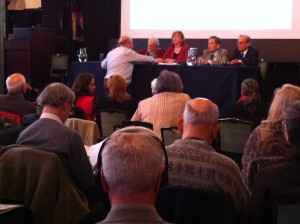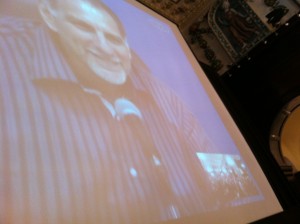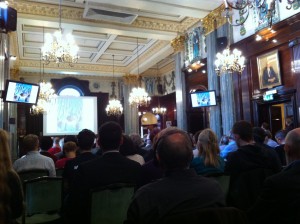
The Cuban 5 are Rene Gonzalez, Ramon Labanino, Fernando Gonzalez, Antonio Guerrero and Gerardo Hernandez. Last week, Fernando Gonzalez was freed after serving 17 years in jail.
The range and number of witnesses to the Commission of Inquiry indicated the width and complexity of the issues involved. The first day of the two day hearing dealt with the background to the actions of the 5. The daughters of two victims of attacks against Cuba – one a mid-flight attack on a Cuban plane, the second an attack on the Cuban Embassy in Lisbon, Portugal, in 1976, spoke of the deaths of their parents. Giustino di Celmo, by video testimony, the father of the victim of the attack on the hotel in Havana on 4 September 1997, described the events of that day. Lorenzo Gonzalo from Radio Miami spoke of the activities of the groups in Miami. And there was a panel discussion, not part of the Commission, with Ramsay Clark, a former US Attorney General, Miguel Angel Marinez, the Vice President of the European Parliament and Ricardo Alarcon, the former President of the National Assembly of Cuba. And finally, Rene Gonzalez gave his testimony via a Skype link, from Havana. Rene Gonzalez was released from custody in 2011, having served 14 years in jail.

Rene Gonzalez speaks from Cuba
Through a link that was weak, cracked, and sometimes completely absent, he described his work, infiltrating the groups in Miami and learning about their projects aimed at destabilising the Cuban government. The information about the groups and their projects was handed to the American authorities. But instead of arrests being made from the membership of those groups, the Cuban 5 were arrested.
And then began the judicial treatment of the 5 which has been the basis of the concern of campaigners.
On day 2 of the Commission – International Women’s Day – the panel heard evidence about the legal process. Martin Garbus, described as the world’s leading human rights lawyer, who took over the case after the death of Leonard Weinglass in 2011, spoke about the background and the appeal process. Then, speaking from a page containing the briefest of notes, Philip Horowitz, the defence lawyer of Rene Gonzalez, held the 300 members of the audience spellbound as he gave what was in effect a closing speech to a jury. He described the moment the phone in his office rang in 1998 when a representative of the local court said words to the effect, ‘We have a man who needs a representative. We gave the case to one lawyer but when he became aware of the background to the case he said it was too political and he wouldn’t touch it.’ And at that moment the life of Philip Horowitz changed. He has seen the children of Rene Gonzalez grow up and have children of their own, he has worked tirelessly to raise the issues, to get visas for the family to visit, to see the papers in the case, to have the trial moved, to take appeal points when possible. And when Irmita Salanueva, the daughter of Rene Gonzalez, and Olga Salanueva, his wife, gave their evidence, they expressed their enormous gratitude to this down-town defence attorney from Miami.
The trial took place in 2001. It lasted 7 months. The jury returned guilty verdicts after 4½ days deliberation. Between the verdicts and sentencing, September 11 happened. It does not take a wild stretch of the imagination to imagine that the events of that day had an impact on the sentences the men received in December of the same year.
Amnesty International through Angela Wright, gave evidence of the great concern at the treatment of the 5, and their families. Amnesty has said that the US treatment of the Cuban 5 is ‘unnecessarily punitive and contrary both to standards for the humand treatment of prisoners and to states’ obligation to protect family life.’
Gerardo Hernandez is serving two life sentences for alleged involvement (a charge of conspiracy) in the shooting down of two planes belonging to the Brothers to the Rescue group, flying over Cuban air-space, where 4 pilots were killed. It is feared that he will die in prison. Adriana Perez, the wife of Gerardo Hernandez and Elizabeth Palmeiro the wife of Ramon Labanino, gave moving evidence of their struggles to see their husbands. Difficulties obtaining visas, being questioned for hours by immigration officials, long journeys across America to the different prisons, to be told on more than one occasion that there was a lock-down in the prison, and no visits were taking place.
 On the second day, as on the first there was a panel discussion. On that second panel were Alice Walker, the novelist, Irmita Salanueva, the daughter of Rene Gonzalez, Mirta Rodriguez, the mother of Antonio Guerrero, and Kenia Serrano the President of the Cuban Institute for Friendship with the Peoples (ICAP). During the panel session, as Irmita was speaking, a mobile phone rang. Irmita stopped, saying she was distracted because Mirta Rodriguez was talking to Antonio. It was Antonio Rodriguez, one of the Five. He was speaking from prison in the US. Quickly the phone was switched to loud-speaker and amplified through a microphone and Antonio spoke to the audience. It was a completely unexpected and powerful moment. Antonio Rodriguez is due to be released in 2017.
On the second day, as on the first there was a panel discussion. On that second panel were Alice Walker, the novelist, Irmita Salanueva, the daughter of Rene Gonzalez, Mirta Rodriguez, the mother of Antonio Guerrero, and Kenia Serrano the President of the Cuban Institute for Friendship with the Peoples (ICAP). During the panel session, as Irmita was speaking, a mobile phone rang. Irmita stopped, saying she was distracted because Mirta Rodriguez was talking to Antonio. It was Antonio Rodriguez, one of the Five. He was speaking from prison in the US. Quickly the phone was switched to loud-speaker and amplified through a microphone and Antonio spoke to the audience. It was a completely unexpected and powerful moment. Antonio Rodriguez is due to be released in 2017.

In May 2005 the United Nations Commission on Human Rights adopted a report criticising the trial and the sentences, noting (section 29) ‘from the facts and circumstances in which the trial took place and from the nature of the charges and the harsh sentences handed down to the accused that the trial did not take place in the climate of objectivity and impartiality that is required in order to conform to the standards of a fair trial…’
At the end of the second day the panel presented their Preliminary Conclusions, where they expressed the view that pardons should be immediately granted to all five. The report of the 2014 International Commission of Inquiry is expected to be published in time to be presented to the White House and used as part of a lobbying and information exercise to Congress in June 2014.
The campaign continues.





